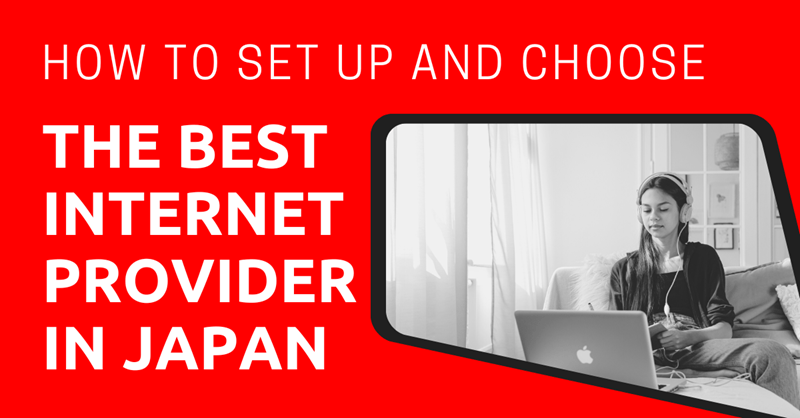
In Japan, if a landline internet connection isn’t included in your rent, you might need to set it up yourself.
While the process might seem daunting given the variety of options and potential language barriers, it’s quite straightforward and not as difficult as you might anticipate.
In this article, we’ll guide you through setting up the internet in Japan as an expat. We’ll cover the options available to you, expected monthly costs, and the benefits of each choice.
It’s important to note that this article primarily targets expats.
For short-term visitors to Japan, there are multiple options like pocket wi-fi services, data SIM cards for phones, or using Wi-Fi hotspots in your travel area. These topics have been extensively covered in other sources, with a wealth of information for travelers coming here for a temporary visit.
This article will take approximately 9 minutes to read. Don't have the time right now? No worries. You can email the ad-free version of the article to yourself and read it later!
Disclaimer: This article may include links to products or services offered by ExpatDen’s partners, which give us commissions when you click on them. Although this may influence how they appear in the text, we only recommend solutions that we would use in your situation. Read more in our Advertising Disclosure.
Contents
Fiber-Optic Cables vs ADSL Lines
Although this may be common knowledge, it’s worth noting that internet connections in Japan come in two main forms: wired (hardline cable) and wireless (Wi-Fi-based connection).
The wired connections, which utilize fiber-optic cables or ADSL lines, can typically be installed in any residence.

Wired connections offer faster speeds and more stable connectivity.
If you’re considering connecting your computer directly (a choice many computer gamers opt for), you should verify whether a Hikari fiber-optic line is used or if the more prevalent ADSL (Asymmetric Digital Subscriber Line) will be installed.
The ADSL line is noticeably slower. While it’s adequate for media streaming and web browsing, gamers might experience lag during gameplay.
Both primary wired internet services can deliver speeds ranging from 1 Gbps (billions of bits per minute) to 2 Gbps, but this varies based on your chosen provider.
Router
Choosing a Wi-fi router for your home is your decision. Many people simply use the router provided by their internet provider.
However, if you’re serious about getting the best performance, here’s a linked list of top-recommended routers for your consideration.
Top Internet Service Providers
As a resident of Japan, you have numerous reliable internet options. But not all of them are suitable for expats because of the language barrier.
In this section, I’ve compiled a list of recommended Internet Service Providers suitable for new residences.
These services all provide English support, and I’ve linked their English web pages if you want to sign up with them.

Notable companies include GTN Hikari, Sakura Fiber Internet, NTT EAST, NTT WEST, Au Hikari, SoftBank Hikari, and Docomo Hikari. I can personally vouch for SoftBank Hikari, boasting a maximum speed of 1Gbps and holding the record for the fastest average speed among fiber-optic services.
For those needing ultra-high-speed internet, such as gamers, Nuro Hikari stands out. Provided by Sony’s “so-net” service, it offers a whopping 2Gbps, making it Japan’s fastest.
Unfortunately, not everyone can access this service; if you live in a building that is higher than 8 floors, the structure of the building will not allow for Nuro Hikari installation.
Another important point is that the companies that provide service vary slightly in each region of Japan.
For example, if you’re considering NTT, one of Japan’s largest and fastest providers, you’ll need to verify what provider you will use based on your region.
NTT West and NTT East can be considered as a different company and serve entirely different prefectures in Japan.
Cost
Typical monthly internet costs range between 4,000 yen and 6,000 yen.
This estimation includes potential installation costs and monthly router fees if you opt to rent equipment.
Installation costs can vary, generally ranging from 15,000 yen to 30,000 yen.
Factors influencing the cost include the age of your residence — newer buildings usually facilitate easier internet installation, often resulting in lower installation costs compared to older buildings.
Prices also fluctuate based on connection type and chosen provider. We will talk more about it later in the article.
Setting up Your Internet
Your first step is to visit the official website of the internet provider.
While offerings might seem similar, differences in prices, cancellation fees, contract lengths, and other factors exist.
After you know which one to choose, you can submit an application form directly at their website.
You will need to provide your address and full name in Katakana (be careful about the order in which you write your name, and ensure it matches your bank account since your monthly payments will be automatically withdrawn from there).
During the application, you will need:
- a resident card
- a registered address
- a bank account in your name for payments.
After you fill out your information online, a customer service representative will confirm the time and date when they can send a technician to your house or apartment.
Signing a Contract
Remember, when signing up for internet service in Japan, you will almost always have contracts with two separate companies: your phone provider and your Internet Service Provider.
That being said, sometimes you can kill two birds with one stone and sign up for both when you get your phone!
Your phone provider will almost always suggest an internet provider that is somehow connected to their service.
This could potentially include discounts and incentive programs for you as a customer.
They work in conjunction: the phone company is responsible for providing the necessary cables to connect to the internet, while the provider enables internet connections via the optical fibers.
It’s unnecessarily confusing, but you pay for your phone and your internet separately.
Installation Time
Always consider the amount of time it will take for cable installation.
On average, it takes between two weeks to a month from the time you apply until the fixed-line internet connection is installed, but anticipate longer waits during peak times.
If you are moving during the busiest times of the year for relocation in Japan (March, April, May), expect a delay of up to one month.
The company you sign up with will most likely offer you a temporary 4-5G Wi-Fi hub with unlimited data while you wait.
For instance, Softbank might offer you a temporary Softbank Air, a convenient home Wi-Fi hub, to keep you connected until your hardware is installed.
Alternative Options
If you don’t want to deal with paperwork and installation challenges with setting up an internet, it’s worth noting that many foreigners prefer long-term pocket Wi-Fi rentals instead.
These rentals are often less expensive and offer the flexibility of use across Japan.
Prices generally depend on your cellphone provider, with contract durations ranging from one month to three years, including an initial device fee.
On average, the cost is around 30 dollars a month from my research. One popular option is iVideo, known for its diverse service range, unlimited data, and speeds of 304/602 HW.
Japan Wireless and Sakura Mobile are another two popular options.
Remember, while pocket Wi-Fi in Japan often offers 5G or 4G/LTE, it might not be stable enough to meet your needs, especially if you’re an online gamer or stream regularly.
Additionally, it may not be as convenient as a router, especially when working from home.
Internet Security
Internet security in Japan is a growing concern. You should be aware of some online scams in Japan and ensure that your internet connection is secure with password protection.
As a foreigner moving to the country, be vigilant about any malicious attacks and never sign up for something you don’t understand completely.
Try to familiarize yourself with common malware, scam sites, and spam mail in Japan. The issue of spam mail (and phone calls) has escalated in recent years. Some mails sent to your inbox don’t contain an unsubscribe link, so you might need to set your account to send them directly to the trash.
There have also been recent cybersecurity issues in the news, and you should have at least a basic understanding of these problems.
Now, on to You
Having reliable internet is crucial for everyone in this day and age.
To sum it up, in Japan, you need to assess your personal needs, decide on the desired connection speed, and then select a company that meets those criteria. Remember to consider all setup fees, installation wait times, and prices.
Most importantly, read the fine print in your new contract. If available, obtain a contract in English and go through it thoroughly.
While it might seem daunting initially, setting up the internet in Japan is a straightforward task, just like any other process.






